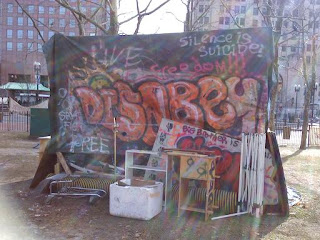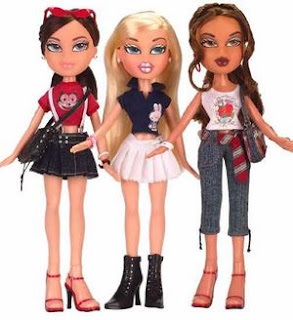Thursday, January 19, 2012
Occupy Providence

At Occupy Providence, I spoke to a twenty-six year old named Charles, who is a self-proclaimed anarchist and has been at Occupy Providence for ninety-three days. Charles spoke about his first encounter with government policies that infringed on his rights as a citizen of the United States: at age sixteen, he wrote a political poem, which he posted on the website deviantART, an "online art community for artists and art lovers to interact in a variety of ways, ranging from the submission of art to conversations on a number of topics. In its purest form, deviantART is a means for expressing yourself in a variety of ways" ("deviantART"). Charles received a government email soon after posting his poem that told him he had to take the poem down from the website or else the government would press charges against him. He simply wrote back that he would not take the poem down and that if someone wanted to press charges, he would happily go to the Supreme Court and defend his First Amendment freedom of speech.
Wednesday, January 18, 2012
Sex, Money, And Gender Equality: The Third Wave Of Feminism (Extended Comments)
Monday, January 16, 2012
Together We Can Make A Difference (Connections)

Sunday, January 15, 2012
Petition to Redistribute GPA Scores
Thursday, January 12, 2012
Women And Social Class
Wednesday, January 11, 2012
What Women Want And Why (Quotes)
Tuesday, January 10, 2012
The Transformation of Toys (Hyperlinks)
 of this change is the "New Dora." She is meant to be an older version of the TV show character Dora the Explorer, who is adventurous and smart and doesn't care about appearance. "New Dora," however, is tall and skinny and pretty and wears a dress with ballet flats instead of shorts and sneakers. She has lost her childhood innocence, as well as her desire to be anything other than pretty. Although this transformation may fare well for marketing companies, it is sparking fear in parents who don't want their daughters becoming sexualized or materialistic. Authors Mikel Brown and Sharon Lamb have gone so far as to create a petition against "New Dora," as stated in a Washington Post article in 2009. A link to the petition can be found within the article.
of this change is the "New Dora." She is meant to be an older version of the TV show character Dora the Explorer, who is adventurous and smart and doesn't care about appearance. "New Dora," however, is tall and skinny and pretty and wears a dress with ballet flats instead of shorts and sneakers. She has lost her childhood innocence, as well as her desire to be anything other than pretty. Although this transformation may fare well for marketing companies, it is sparking fear in parents who don't want their daughters becoming sexualized or materialistic. Authors Mikel Brown and Sharon Lamb have gone so far as to create a petition against "New Dora," as stated in a Washington Post article in 2009. A link to the petition can be found within the article.
Sunday, January 8, 2012
Living Outside The Master's House (Reflection)
Wednesday, January 4, 2012
Invisible Privileges (Argument)
“Privilege, Power, and Difference”
By Allan G. Johnson
In these first few chapters of Johnson's book, there were two main arguments (or themes) that appeared repeatedly and struck me as extremely important parts of examining the issues of race, gender, and sexual orientation. The first of these arguments is that privilege belongs to GROUPS not INDIVIDUALS. The second argument is that belonging to a privileged group means never having to be AWARE of one's membership in that group.
Johnson discusses the fact that people become defensive when told that they belong to a privileged group. They take this to mean that they are personally responsible for harming the oppressed group or the individuals within that group. What Johnson attempts to explain in these chapters is that it is not individual people who have advantages or who are taking advantages from others. Instead, he argues that our society is designed so that certain groups of people (such as men or heterosexuals) have an easier time of getting good things in life than other groups (such as women or black people). Johnson knows that he belongs to several privileged groups, but he understands that his privilege is not created by him but by something much bigger:
"As a white, male, middle-class heterosexual, I know that in some ways these words are about me. There's no way to avoid playing some role in the troubles they name, and that's something I need to look at. But in equally important ways, the words are not about me because they name something much larger than me, something I didn't invent or create, but that was passed on to me as a legacy when I born into this society" (13).
Johnson further explains this idea by arguing that in order to belong to a privileged group, one does not need to have a certain personality or any personal identity whatsoever. They just need to be able to convince others that they belong to the privileged group:
"I'm not race privileged because of who I am as a person. Whiteness is privileged in this society, and I have access to that privilege only when people identify me as belonging to the category 'white.' I do or don't receive race privilege based on which category people put me in without their knowing a single other thing about me" (35).
In making the argument that privilege belongs to groups, not individuals, Johnson attempts to make those belonging to privileged groups more comfortable with talking about dominance and oppression without feeling guilty and/or defensive.
Johnson also recognizes that those belonging to advantaged groups can become irritated or defensive because they do not believe themselves to have any sort of advantage. However, as Johnson reveals, this is often a result of the fact that privilege becomes invisible to those who have it. For several pages, Johnson lays out examples of ways in which people belonging to privileged groups can live their daily lives without thinking about the privileged aspect of their identity. For instance, a man can walk to his car at night without thinking about his gender because this part of his identity does not affect him negatively in this situation. On the other hand, a woman walking anywhere alone at night will most likely be aware of her womanhood because this part of her identity makes her more vulnerable to being attacked. Being part of a privileged group means having the ability to live life without being highly aware of that part of oneself. This gives one the capacity to think of oneself merely as a person, rather than a black person or a homosexual person. It grants one the freedom to enjoy one's own unique personality, rather than having to concentrate on the group that one is lumped with. In making this argument, Johnson attempts to give those belonging to privileged groups a new way of looking at their everyday experiences that will make their advantages more visible to them.
This reminded me a lot of something we talked about in class today. We mentioned the fact that we don't notice a certain part of our identity until it is the part that sticks out the most. For instance, if I (a woman) am in a room with all men, I will be highly aware of my gender. However, if I am in a room with all women, I most likely will not be thinking about the fact that I am a woman. For the time being, this part of me will become invisible. In writing this book, Johnson hopes to make many invisible parts of our identities reappear.